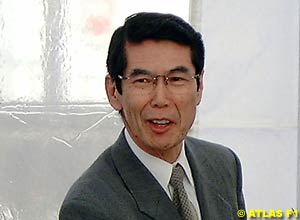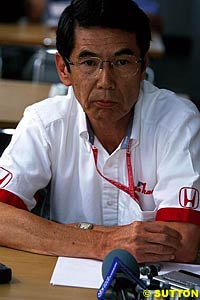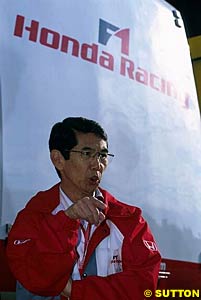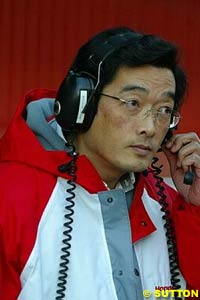
Atlas F1 Editor in Chief
One of the largest and most successful road car makers, Honda has had mixed success in Formula One. As constructors in the sixties they won some and lost some; as engine suppliers in the eighties they won most and lost little. Nowadays, even points are rare - but Honda Racing president Shoichi Tanaka knows exactly what needs to be done to rectify that. Biranit Goren interviewed Tanaka-San, a man with plenty of patience
Two hundred and fifty Grands Prix for any motor company is a lot. Fact is, Honda is now fourth with the number of Grand Prix starts - behind Ferrari, Ford and Renault. Not a bad company to keep. Yet Honda is probably the most low-keyed manufacturer in Formula One today.
Tanaka-San fits perfectly as the project's leader, because he knows every aspect of Honda so well. More importantly, he knows why they're in Formula One - and he knows what they need to do to achieve their goal (and why it eludes them): to become, once again, Grand Prix winners.
Q: Congratulations on your 250th Grand Prix, it's quite a milestone for you
Tanaka: "Well, I don't know how many races we have that we didn't win among those 250 Grands Prix! But when did we win last? 1992? We can only be proud of how many wins, not how many races we've participated in. Nonetheless, this is a demonstration that Honda is committed to motorsport. I think there are only a few manufacturers who have participated in 250 races, so we are proud of that."
Q: It's interesting that you mention your commitment. It's now fashionable to talk about the involvement of auto makers in the sport - and one of the point that the FIA brings up is the fact that the manufacturers are fickle - they come and go. So how do we know that you're here to stay?
Tanaka: "Sometimes I feel uncomfortable to hear (FIA president) Max Mosley say - or even give the impression - that car manufacturers are not too reliable in motorsport because they come and go. Well, without the car manufacturers - without the engine manufacturers - how can Formula One be exciting? Yes, of course the car makers - who are run by public companies - can come and go; F1 activity is not the whole operation. But when one goes another comes in. The car manufacturers came and went but they were always there. The members changed, but there were always manufacturers.
"We are one of the few car manufacturers that were present most of the time, in the 1980s. Which car manufacturer was devoted like Honda in the 1980s? There are many now, but back then we were one of the few. So it's correct that some will go and some will stay, but in general the car manufacturers will always be here."
Q: Why is Honda not a shareholder in the GPWC? They did invite you to join
Tanaka: "Well, the original initiative for a breakaway series was taken by ACEA (The Association of European Car makers), and we are not a member of ACEA. So originally we weren't a part of it. It's true that once the GPWC was formed they invited us to join as shareholders, but we have not made our decision on this yet. The intention of ACEA/GPWC is to have a fair distribution of the income from the sport - and at the same time improve the transparency of the operation. The accountability and transparency of this sport is important to the auto makers' shareholders. We support those intentions.
Q: So you support the objectives, you just don't care how they are obtained?
Tanaka: "That's correct, yes."
Q: So are you part of the negotiations with Ecclestone? Are you involved in it?
Tanaka: "No. We are constantly kept informed of the situation but we are not part of the negotiations."
Q: You said you haven't made a decision about the GPWC. What happens if they do not reach an agreement with Ecclestone and there is a new series, will you join it?
Tanaka: "I do not believe there will be a new series. I believe there will be a compromised agreement. (Mercedes-Benz chairman) Jurgen Hubbert is saying it will be done by October this year, but I cannot judge how close they are to signing it. The schedule continues to be extended - but I believe it will be signed by the end of this year."
Q: Why is it, then, that you're not actively involved in the negotiations?
Tanaka: "It may sound egoistic, but we're in Formula One for the technical challenge only. In fact, the reason why we dropped the idea of forming our own team four years ago is because we are not interested at all in the political aspect of Formula One. That has always been our stance. We have a partner, BAR, and David Richards presents our ideas in such political scenes, so I always communicate our ideas to him and he represents us in the public. It's enough for us at the moment. We want to concentrate as much as possible on the technical challenge."
Q: It's interesting, considering nowadays there is a shift towards having a team as one unit - like Ferrari, Toyota, Renault, Jaguar. Yet you made a decision to go against this trend and not form your own team. Was it only because of politics?
Tanaka: "The main reason was that we wanted to concentrate on technical matters. We wanted to be involved in chassis technology - which we didn't do in the past - so in order to be involved in chassis development we thought that we need to own the team. So we went ahead with that kind of plan to begin with. But, finally we had a compromising scenario of BAR coming and offering us a joint chassis development.
"So we thought, OK, without owning the team and having to go to the meetings and signing the Concorde Agreement and having to go to all those social activities of black tie parties - which are not among our objectives - we can get involved in what we wanted on the technological side, but not be involved in the aspects that don't interest us. We thought that would be a good framework."
Q: The downside to that is that BAR will take the credit for any success that will come your way. If Ferrari or Toyota have a good result, the credit goes directly to their name. With you, BAR gets the credit - not the Honda name
"We spend sometimes a lot of effort and energy to communicate and to come to agreement... it is, frankly speaking, the downside compared to one manufacturer's team."
Q: Since you mention management, BAR in particular - since you joined them in 2000 - have had many management and technical staff changes. Craig Pollock was replaced, Adrian Reynard...
Tanaka, laughing: "Yes, yes... you don't have to remind me, I have been witness to all that! But that is the risk and the price we have to pay in working with the (then) youngest team on the grid. That is the price we have to pay."
Q: Do you feel that the team is heading towards stability, though? Do you see a better harmony in how you two work together?
Tanaka: "Well, our chassis technology was of course premature. We did not have many Honda engineers who were experts in making a Formula One chassis. And with over three years' experience, I think we have come very well of being able to contribute and understand each other on how to make an F1 chassis, and so on. So this time has helped us to produce the results of making a better car together. So, yes, I think this technology integration is going to bear fruit in the near future."
Q: How much involvement do you have in the running of BAR, though? Do you, for example, have a say in the team as far as which drivers they hire?
Tanaka: "We are constantly talking together; our contractual relationship stipulates that they consult with us over the drivers' issue. So it's not a one-sided decision. But the final decision is with the team, even if we are well consulted."
Q: Jacques Villeneuve mentioned that in 2000 Honda asked him to stay. He then said that right now Honda are not very vocal... The impression is that you perhaps don't want him to stay?
Tanaka: "Jacques was negotiating whether to renew the contract with BAR in 2000, and I remember that we were consulted, and we wanted Jacques to stay. It is true. Although, again, the decision was with the team. Craig Pollock concluded with him for three years and for such and such money - in that were not involved."
Q: Are you now consulted with regards to Jacques?
Tanaka: "Yes, we are."
Q: And? Do you want him to stay?
Tanaka: "Well, this is a very delicate situation, because we understand the team is negotiating with other drivers as well as with Jacques. And so it would be wrong for the drivers and the team to hear our opinion on the matter in an interview like this."
Q: OK, separately from the current situation, can you tell me how important is it for Honda to have a Japanese driver?
Tanaka: "It is important. To have a Japanese driver, it will be very good. I don't know how much you know about American baseball, but we have major league Japanese baseball players now, and so major league baseball is becoming very popular in Japan. Likewise in soccer: we have guys who are going out of Japan and into first class teams in Europe, and the level of enthusiasm for soccer in Japan is going up.
"In motorsport, we had some Japanese drivers in the past and at that time they were pretty popular but performance wise these drivers weren't so great. So what we really need is a first class Formula One driver to animate the interest for F1 in Japan. So it is important.
"But, we always take the stance of performance first. If a Japanese driver makes his way by himself to be a top F1 driver, we will be extremely happy. But we do not recommend to BAR to select a driver only by nationality."
Q: You are also partners to Bridgestone, another Japanese company. How much is that a factor in your selection of tyre manufacturers? Would that stop you from switching to Michelin?
Tanaka: "Actually, we do not regard Michelin as a French tyre and Bridgestone as a Japanese tyre. We never think of the nationality of the tyre companies. For example, we work very closely on the road cars with both Bridgestone and Michelin, very evenly. I cannot say now off hand what percentage of our road cars application is Michelin and what is Bridgestone, but I think we are a big customer for Michelin as well. So there is no nationality issue."
Q: The reason I ask is because BAR are rumoured to be looking at switching to Michelin next year...
Tanaka: "Again, the tyre choice is up to the team. Although with the joint chassis development contract we are involved in the discussions, the final decision is up to the team."
Q: You mentioned that Honda is in Formula One only for the technical challenge. Some of the other car makes are here also - or even more so - for marketing purposes. Being in F1 sells cars. For example Toyota, their decision to come into the sport was primarily for marketing reasons. Is it not the case for Honda?
Tanaka: "Unfortunately, we are considered very weak in that kind of activities - linking the motorsports activities to the marketing, effectively. We are sometimes criticised for the poor performance in that respect. When our engines were dominant in the 1980s in F1, I don't remember how much we advertised that!"
Q: So you concentrate on the technical challenge, and yet you are unable to repeat the success you had in the 1980s. What has changed between these two periods to explain your lack of success now compared to then?
Tanaka: "The competitors are different. Competitors now are mostly the car manufacturers - the '100,000 employees' league. In the 1980s, we were one of the very few companies in that scale. Back then it was maybe us against Renault. Now it's Mercedes, BMW, Ford..."
Q: So Formula One is tougher today?
Tanaka: "yes, and we recognise that. In fact, it is more challenging than we thought when we entered in year 2000. Things have turned out more difficult than we thought, so our schedule to reach our target is changing."
Q: So what do you think Honda and BAR have to do to step up to the level of race winners?
Tanaka: "More integration - more understanding in the level of technology and more integration of management. The best engine cannot make the best team and the best chassis cannot make the best team. So more integration of race management, tyres, chassis, engines, drivers. The integration is the key factor, and we are working hard on that now; we have not changed our target of threatening the top teams next year."
Q: Is there more pressure on you to succeed, now that Toyota is in F1?
Tanaka: "Frankly speaking, the Japanese fans and the Japanese dealers are the only ones who talk about the competition between Toyota and Honda - it's a very closed automobile market there. But in Europe and other countries no, not in particular. For us, as a team, all the teams ahead of us are competitors and we will never be satisfied to only be faster than Toyota."
Q: I am thinking about the Honda headquarters, actually. What happens if by the end of the year Toyota passes you in the Constructors' Championship? What will the reaction be in Japan, in the headquarters?
Tanaka bursts out laughing. "Oh, headquarters are already very much pissed off about our position!"
Honda's F1 Project Leader Takeo Kiuchi is another long term Honda employee - but he also stands out as one of the few Honda engineers to have been involved in the second generation project as well as the current one. More so, he is best known in the paddock as Alain Prost's race engineer in 1988, and Ayrton Senna's engineer from 1989 to 1992. He is best positioned to compare between the drivers of then, and the drivers of now.
"Ayrton, for example, would come back from driving a few laps and say 'change the left side rubber 2 millimetre and change the suspension', or 'the tyre pressure by 5 kilo or something' – he, and others back then, knew what to do and how every change affects the car. Essentially today, just Michael Schumacher can do this; the other drivers are there just to drive quickly.
"Compared to ten years ago, Formula One is very systematic – the driver is just here for driving – making the setup of the car is the engineer's job. That is the primary reason for the difference between then and now. The second reason is that everything is now controlled by computers, with traction control and everything – the driver is just sitting there! The driver's jobs now are very few."
Sixty year old Shoichi Tanaka has been with Honda for his entire adult life. After 37 years with the company, the affable Japanese is a perfect ambassador for the car maker in a sport that requires a passion for racing and technology, and an understanding of business and media. With experience as Honda's commercial director in Brazil, sales manager in Europe, president of Honda France, head of Products division for the Japanese market, and vice president of Honda North America, Tanaka-San took his appointment as president of Honda Racing - and head of their third generation in Formula One - with the required grain of salt and feet firmly on the ground.
 With auto makers like Renault, BMW and Mercedes advancing themselves to the centre-stage of the sport's arena, Honda remains quietly on the edge, concentrating on what they call the Third Generation Project - first there was generation one, their entry to the sport in the late 1960s as a constructor. Then there was the second generation - their return to the sport in the 1980s to become one of the most successful engine suppliers of the era. And now there's the third generation - best described as a hybrid of both previous ones. Honda is back as an engine supplier, but the company is also involved in chassis development through its relationship with BAR.
With auto makers like Renault, BMW and Mercedes advancing themselves to the centre-stage of the sport's arena, Honda remains quietly on the edge, concentrating on what they call the Third Generation Project - first there was generation one, their entry to the sport in the late 1960s as a constructor. Then there was the second generation - their return to the sport in the 1980s to become one of the most successful engine suppliers of the era. And now there's the third generation - best described as a hybrid of both previous ones. Honda is back as an engine supplier, but the company is also involved in chassis development through its relationship with BAR.
 "However, my understanding of the situation is that both parties - the car makers and the Formula One Management - are coming very closer to achieve these objectives. I think Bernie Ecclestone realises that the distribution can be modified and the transparency could improved. So whether these objectives are achieved by Ecclestone's company or by the GPWC - we don't care."
"However, my understanding of the situation is that both parties - the car makers and the Formula One Management - are coming very closer to achieve these objectives. I think Bernie Ecclestone realises that the distribution can be modified and the transparency could improved. So whether these objectives are achieved by Ecclestone's company or by the GPWC - we don't care."
 Tanaka: "We don't see this as a very big downside, really. We don't very much care if image-wise BAR or Honda get the credit. Many people know that Honda is deeply involved in the performance of BAR. But I think the actual downside that I can point at, after more than three years' experience, is that, after all, it's not one team. Decisions on personnel, management, what technology to apply in the next race and so on - is not coming out of one team.
Tanaka: "We don't see this as a very big downside, really. We don't very much care if image-wise BAR or Honda get the credit. Many people know that Honda is deeply involved in the performance of BAR. But I think the actual downside that I can point at, after more than three years' experience, is that, after all, it's not one team. Decisions on personnel, management, what technology to apply in the next race and so on - is not coming out of one team.
Sidebar: Takeo Kiuchi - Drivers Then and Now
 "The drivers back then were famous - not only Alain Prost and Ayrton Senna - but also Nelson Piquet and Nigel Mansell, for example. But more to the point, these drivers could make a difference to the car; they could make a major set-up, they could comment, for example, on first corner understeer, second corner oversteer, and they could make an entire setup. Now that is the job of the engineer.
"The drivers back then were famous - not only Alain Prost and Ayrton Senna - but also Nelson Piquet and Nigel Mansell, for example. But more to the point, these drivers could make a difference to the car; they could make a major set-up, they could comment, for example, on first corner understeer, second corner oversteer, and they could make an entire setup. Now that is the job of the engineer.
Please Contact Us for permission to republish this or any other material from Atlas F1.
|
Volume 9, Issue 36
Honda 250: Special Project
Interview with Jacques Villeneuve
Interview with Shoichi Tanaka
Interview with Jenson Button
House of the Rising Sun
Honda's First: Richie Ginther
Honda Through the Lens
Trading Cards: Honda's Drivers
The Honda Trivia Quiz
Columns
On the Road
Elsewhere in Racing
The Weekly Grapevine
> Homepage |
